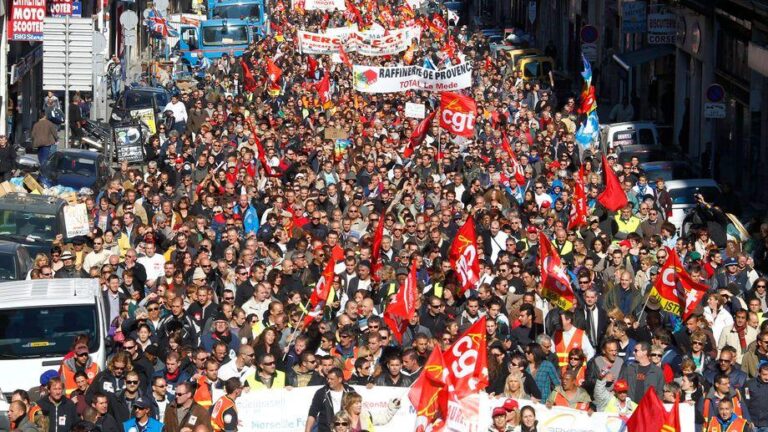France is witnessing widespread nationwide strikes as millions of workers take to the streets in protest against the government’s latest austerity measures. The strikes, organized by major unions and supported by diverse sectors including transportation, education, and public services, have brought significant disruption across the country. This wave of unrest underscores the growing public discontent with fiscal policies perceived to undermine social welfare and worker rights, raising critical questions about the future direction of France’s economic strategy.
France Grapples with Widespread Workforce Unrest Amid Austerity Protests
Across major cities and rural areas alike, workers from multiple sectors have taken to the streets in defiant protest against recent government austerity plans. Public transport, education, and healthcare professionals have been at the forefront, shutting down services and demanding immediate reconsideration of budget cuts that they warn will affect the nation’s social fabric. Demonstrations have frequently turned tense, disrupting daily life and igniting a broader debate on economic policy and social justice.
Key sectors affected include:
- Public transportation (rail and bus networks)
- Healthcare providers and hospital staff
- Public education institutions
- Energy and utility workers
| Sector | Strike Duration | Impact Level |
|---|---|---|
| Transportation | 48 hours | High |
| Healthcare | Ongoing | Moderate |
| Education | 24 hours | High |
| Energy | 72 hours | Low |
Impact of Strikes on Public Services and Daily Life Across the Nation
Across cities and rural areas alike, the ongoing strikes have significantly disrupted public services, challenging citizens as they navigate daily routines. Transportation networks have borne the brunt of the unrest, with train cancellations and limited metro services forcing commuters to seek alternative means. In addition, many schools have either closed temporarily or operated with reduced staff, impacting thousands of students nationwide. Healthcare facilities, too, face strains, as hospital workers join in the protests, resulting in deferred non-emergency procedures and longer waiting times for patients.
The impact extends beyond transport and education, permeating daily life in subtle yet profound ways. Here are some of the most affected sectors:
- Public Transport: 35-50% reduction in service frequency in major cities.
- Education: Over 200 schools temporarily closed or partially operational.
- Healthcare: Elective surgeries postponed by up to two weeks in several regions.
- Waste Management: Collection delays in urban and suburban areas.
| Service | Estimated Disruption | Population Affected | |||||||||||||||||||||||||
|---|---|---|---|---|---|---|---|---|---|---|---|---|---|---|---|---|---|---|---|---|---|---|---|---|---|---|---|
| Rail Services | 40%-60% cancellations | 5 million daily commuters | |||||||||||||||||||||||||
| School Operations | 30% closures | 1 It looks like the last part of the table was cut off. Here’s a completion and clean-up of the table based on the content and style you provided:
If you want me to help with anything else – like improving readability, adding more data, or converting this into a different format – just let me know! Strategies for Negotiation and Restoring Social Consensus in Times of Fiscal ReformAddressing widespread dissent requires a multifaceted approach centered on transparent dialogue and mutual understanding. Authorities must prioritize open communication channels to bridge divides, allowing affected communities and unions to voice concerns while clearly outlining fiscal realities. Engaging independent mediators can also foster trust, ensuring negotiations remain constructive rather than confrontational. Importantly, demonstrating flexibility by proposing phased or targeted reforms can alleviate immediate pressures, signaling a willingness to adapt policies in response to public feedback. Implementing the following tactics can help rebuild social consensus effectively:
To ConcludeAs France continues to grapple with widespread opposition to the government’s austerity measures, the nationwide strikes mark a significant chapter in the ongoing social and political discourse. With unions and citizens united in their demands, the coming weeks will be critical in determining the government’s response and the future trajectory of economic policy in the country. Le Monde.fr will continue to monitor developments closely as the situation evolves. |




